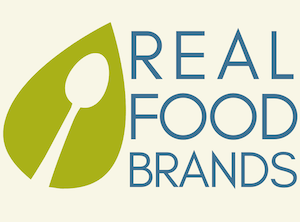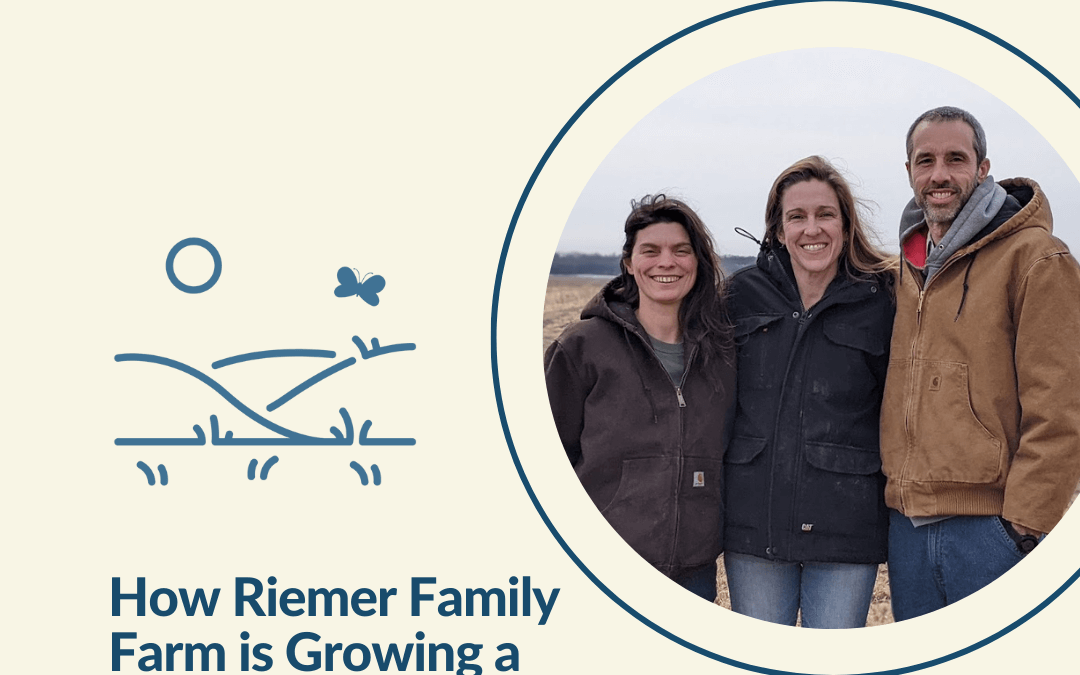A common approach for food and farm businesses is to think about offering a great product rather than building a strong brand. The thinking is that if a product is good enough, taste will ultimately win and of course, people will buy. While this is understandable as you perfect your craft, great taste and quality are expected these days so we don’t want your products to be seen as an interchangeable commodity. There’s so much more to your food brand’s story, so let’s uncover it!
Today on Episode 106 of the Real Food Brands Marketing Podcast, host and Food Brand Strategist Katie Mleziva talks to Jen and Bryce Riemer, and Anastasia Wolf-Flasch, all of Riemer Family Farm, about their journey to define a brand strategy that invites people into a story of caring for and renewing the land through a multi-generation farming business.
How the Riemers Got Started with Regenerative Farming
Regenerative farming actually isn’t just a business to the Riemer family, it’s a way of life.
Bryce was working as a guidance counselor at a high school in suburban Chicago when he and Jen had their first two daughters (now three…they say this farm is run by girl-power + Bryce!). They were invested in learning about the best way to feed their family and wanted to raise their girls on his parents’ farm where he grew up, so they made the decision to move back and start a new chapter back on the farm. Between Jen’s science background and Bryce’s background in farming and ag business in addition to working in schools, Bryce shared “not only did we know how to do this food production thing but we were good with people, and that combination is somewhat rare.”
Today on the farm, they’ve transitioned 100% ownership after initially partnering with Bryce’s parents. With that came a transition over time towards a regenerative farming and direct to consumer business model. Today they focus on using regenerative farming practices that renew the soil health, which is good for the animals as well as people. While at one point they wished things had happened faster to reach their vision, they shared a key lesson they learned…sometimes things need to evolve and play out over time, and farming is a particularly long-game business.
Why Your Brand Story Matters
“The most challenging part about branding was starting,” Bryce says, “because at first, I didn’t think we had an interesting or dynamic story to tell since all of this evolved over 10-15 years.”
However, once they started working through their brand strategy through one of Katie’s programs, there were actually a lot of different angles they considered taking. In the end, the common theme they kept coming back to was related to care for the land and the restoration of the pasture and natural environment. A result of these practices over time is that an incredible number of pollinators come through their farm; a beautiful sign of the fruits of their labor. This led them to a story about caring for the land in a way that led to better food, and ultimately a better life.
They landed on the simple but effective tagline of “Better Food. Better Life.” As Jen puts it, “if you want your body to feel good and to have tight bonds with your family around the dinner table, then good food matters.”
While there were a lot of different directions they could have taken, deciding on these key points for their positioning and pillars helped them craft a focused brand story that has made a big impact on all of their decisions around marketing, packaging, and more.
As Anastasia, who manages customer-facing parts of the farm, puts it, “now that we’re in the oh-so-competitive eCommerce market we have to be hyper-focused.” She shared how different that was versus when they were at farmer’s markets where almost anyone there would buy from their farm.
As they moved from markets to direct to consumer sales, Bryce talked about the shift from selling a great product to building a strong brand. “We started out so excited and thought that our product is all it takes…we love what we do and there’s 25 reasons from social to environmental to health that our products are going to change the world…so all we have to do is put them for sale and everyone is going to want to buy them. But that’s our passion and why we do the best we can, but that’s not how everyone feels. We have learned that those are the things that drive us to do the best that we can, but that’s not how everyone feels. What gets left behind is a branding strategy—a marketing strategy—that can help farmers educate and engage customers.”
One thing they discovered in doing brand strategy work is that they want to come across as caring and genuine. “We want people to see the farm for what it is: we’re not super polished with white tablecloths,” Jen says, “we have a little dirt under our fingernails and we want people to experience that.”
Bryce shared that it takes an investment in brand strategy and marketing and that in hindsight, he wishes they had started with their brand strategy sooner. He says many farmers don’t start this soon enough and get burned out.
As you already know, big food businesses invest heavily in brand strategy and marketing. While you don’t want to walk the exact path they have because your brand is UNIQUE, Katie is here to make sure you have affordable resources to help you uncover your brand positioning, tell your brand story, and invite people to be a part of something that they can’t wait to tell their friends about! You can learn more about working with Katie here.
Now, let’s go shake up shopping carts!
Note: Jen shared several resources related to regenerative farming at the end of the episode for both farmers and conscientious consumers who want to learn more about the need for regenerative farming when it comes to soil, animal, and human health.
Quotes:
“We had our first daughters and were asking how do we want to raise our kids, and what do we feed them? So we were doing all kinds of research into organic food production and farming.” – Bryce Riemer
“We were on social media, had a website, and were communicating, but not as effectively as we could have been. We had this great story, but we were a little too close to it to see just how special it was.” – Jen Riemer
“This work has been a lifesaver, truly. Now that we have a brand story I have it printed off in a binder at my desk, and I know exactly what the focus is, what the message is, and who we’re talking to. It has made communication so much easier and who we are as Riemer Family Farm, and we have a map to go by.” – Anastasia Wolf-Flasch
In This Episode:
- What led Jen and Bryce Riemer from city life back to their multi-generation family farm.
- How they honor the farm’s rich history while also building their own legacy.
- Why the farm’s one full-time employee is focused on marketing and customer service.
- The most challenging and valuable parts of working through their brand strategy.
- How having brand pillars and a story defined has impacted their logo, packaging, and website.
- Before and after insights about how this work has impacted their business.
- Resources to learn more about the importance of regenerative farming.
Resources:


